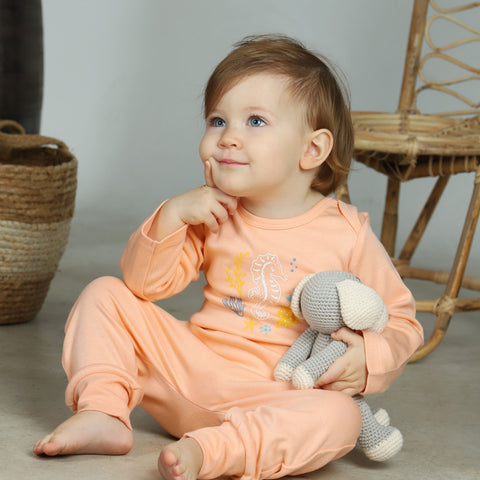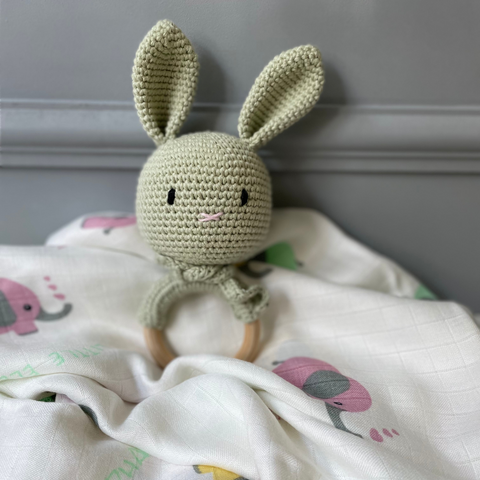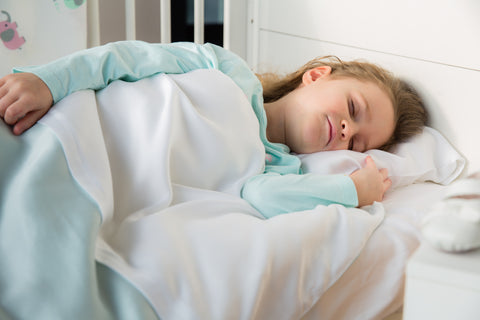In today's fast-paced world, parents are increasingly turning to eco-friendly options for their families, seeking products that not only promote health and well-being but also contribute positively to the planet.
As eco-conscious parents ourselves, we understand the importance of making sustainable choices for our children's future. In this blog, we'll explore the benefits of eco-friendly parenting and offer practical tips for incorporating sustainable practices into your family's daily life.
As parents, we all rely on baby products to raise our children. Fortunately, in today's world, we have the opportunity to make small adjustments to our shopping choices in order to minimise the negative impact on the environment.
Fast Fashion Baby Clothing
In recent years, the rise of fast fashion has dramatically changed the way we shop for clothing, including baby clothing. Fast fashion refers to the rapid production of inexpensive clothing in response to the latest trends, resulting in frequent turnover of styles and cheaply made garments. While these clothes may seem convenient and budget-friendly, the environmental cost is often overlooked.
One of the primary concerns with fast fashion baby clothing is its high resource consumption and carbon footprint. The production process involves intensive water usage, chemical treatments, and energy consumption, leading to pollution of waterways, air, and soil. Additionally, the use of synthetic materials like polyester and nylon, which are derived from non-renewable resources, further exacerbates environmental degradation.
Many parents are lured by the low prices and trendy designs, but these garments often lack durability and longevity. As a result, they are quickly discarded and end up in landfills, contributing to the growing textile waste problem. According to studies, the fashion industry is one of the largest contributors to global waste, with millions of tons of clothing discarded each year.
Moreover, the production of fast fashion garments often involves exploitative labor practices and poor working conditions in garment factories, especially in developing countries. Workers, including children, are subjected to long hours, low wages, and unsafe working environments, further highlighting the ethical concerns associated with fast fashion.
Bebekish's suggestion for baby clothing:
At Bebekish, we firmly believe that superior quality baby products should not come hefty price tag. We understand the importance of longevity and sustainability in every purchase decision. Our ethos revolves around investing in items that serve you well over time, whether it's for your current bundle of joy or passed down for future generations or donated to benefit others in need.
Contrary to the fast fashion culture of fleeting trends and disposable garments, we advocate for conscious consumption that prioritises durability and reusability. By opting for well-crafted, enduring pieces, you not only enhance your own parenting journey but also contribute to a more sustainable future. It's about making choices that resonate with your values and leave a lasting, positive impact on both your family and the environment.
Visit our Organic and Bamboo Clothing section for more information.

Disposable Diapers
As a conventional parent we would choose disposable nappies for our kids. However, the environmental toll of disposable diapers is substantial. These single-use products are made from non-biodegradable materials, such as plastic and synthetic chemicals, which take hundreds of years to decompose in landfills. As a result, billions of disposable diapers end up in landfills each year, contributing to environmental pollution and greenhouse gas emissions.
Additionally, the production of disposable diapers requires vast amounts of resources, including water, energy, and raw materials. From the extraction of petroleum for plastic production to the bleaching and processing of wood pulp for absorbent cores, the manufacturing process is resource-intensive and contributes to deforestation, water pollution, and habitat destruction.
Bebekish's suggestion for conventional nappies:
Instead, you could choose cloth diapers or eco friendly diapers... They are reusable, reducing the amount of waste sent to landfills. They come in a variety of styles and materials, including organic cotton and bamboo, which are gentle on baby's skin and environmentally friendly.
Plastic Toys
Plastic toys are another common feature in many households, prized for their durability and affordability. However, the production and disposal of plastic toys have significant environmental consequences. Most plastic toys are made from petroleum-based materials, such as polyethylene and polypropylene, which are derived from non-renewable fossil fuels.
The manufacturing process of plastic toys generates pollution and greenhouse gas emissions, while the disposal of these items adds to the global plastic waste crisis. Many plastic toys end up in landfills, where they can take centuries to break down, releasing harmful chemicals and micro plastics into the environment.
Furthermore, plastic toys contribute to ocean pollution, as plastic waste often finds its way into rivers and oceans, endangering marine life and ecosystems. The presence of toxic chemicals in plastic toys, such as phthalates and bisphenol A (BPA), poses health risks to children and wildlife alike, highlighting the need for safer, more sustainable alternatives.
Bebekish's suggestion for plastic toys:
Wooden Toys
Wooden toys are durable, natural, and often made from sustainably sourced wood. They come in various shapes and sizes, from building blocks to puzzles, encouraging imaginative play and creativity in children.
Check out Bebekish Organic Toys to have some quality time with your little one!

Soft Fabric Toys
Fabric toys made from organic cotton, hemp, or bamboo are gentle on baby's skin and environmentally friendly. Look for stuffed animals, dolls, or sensory toys made from natural fibers and filled with eco-friendly materials like organic cotton or recycled polyester.
Check out Bebekish Organic Toys to have some quality time with your little one!
Natural Rubber Toys
Natural rubber toys, such as teething toys and bath toys, are free from harmful chemicals and plastics. Made from the sap of rubber trees, these toys are biodegradable and safe for babies to chew on.
DIY Toys
Get creative and make your own toys using household items or natural materials. DIY projects like sensory bottles, cardboard forts, and homemade playdough are not only eco-friendly but also provide endless entertainment for children.
By choosing eco-friendly toys, parents can promote sustainability, reduce plastic waste, and create a safer and healthier environment for their children to play and grow.
Cleaning Products
Cleaning products play a crucial role in maintaining hygiene and cleanliness in our homes and workplaces. However, many of these products contain harmful chemicals that can have detrimental effects on the environment.
1 - Water pollution: When cleaning products containing harsh chemicals are rinsed down the drain, they can contaminate water sources such as rivers, lakes, and oceans. These chemicals can disrupt aquatic ecosystems, harming marine life and contaminating drinking water supplies.
2- Air pollution: Volatile organic compounds (VOCs), found in many household cleaners, can react with other pollutants in the air to form ozone, a harmful air pollutant that can negatively impact human health and the environment.
3 - Environmental degradation: The manufacturing process often involves the extraction of natural resources and the release of greenhouse gases and other pollutants into the atmosphere. Moreover, the packaging of cleaning products, often made of plastic, contributes to plastic pollution when not disposed of properly.
Bebekish's suggestion for cleaning products:
To mitigate the environmental impact of cleaning products, consumers can opt for environmentally friendly alternatives. These include products labeled as "green," "eco-friendly," or "biodegradable," which are formulated with natural ingredients that are safer for the environment. Additionally, reducing the use of disposable cleaning wipes and opting for reusable cleaning tools can help minimize waste.
Always check the labels and make sure that ingredients are sourced naturally.
Biodegradable Wipes
Conventional wipes are often made from non-biodegradable materials like polyester or polypropylene, which contribute to plastic pollution. These materials can take hundreds of years to break down in the environment, leading to accumulation in landfills, waterways, and oceans.
Biodegradable wipes, on the other hand, are made from natural fibers like bamboo or cotton, which decompose much faster, reducing the burden of plastic waste on the environment.
The production of biodegradable wipes typically involves fewer resources and energy compared to conventional wipes made from synthetic materials.
Biodegradable wipes often use renewable resources and eco-friendly manufacturing processes, resulting in a lower environmental footprint overall.
Sustainable Nursery Decor
Many conventional nursery decor items, such as crib mattresses, bedding, and furniture, are made with materials that contain harmful chemicals like formaldehyde, phthalates, and flame retardants. These chemicals can off-gas over time, leading to indoor air pollution and potential health risks for your baby, including respiratory issues, allergies, and developmental problems.
Bebekish's suggestion for nursery decor
Sustainable nursery decor is our choice to have a indoor air quality and reduce the risk of respiratory issues or allergies for your baby. It is often made from natural materials such as organic cotton, bamboo, or sustainably sourced wood, which emit fewer volatile organic compounds (VOCs) compared to conventional materials.
Sustainable nursery decor is typically produced using eco-friendly manufacturing processes and materials that have a lower environmental footprint. By choosing items made from renewable resources and recycled materials, you can minimize your contribution to deforestation, water pollution, and carbon emissions.
From organic bedding and non-toxic paint to eco-friendly rugs and natural wood furniture, there are plenty of options to create a beautiful and inviting space for your baby while still prioritising sustainability.

As parents, we have the power to shape the world our children will inherit. By embracing eco-friendly parenting practices and making sustainable choices, we can create a brighter future for generations to come. Together, let's take small steps towards a greener, more sustainable world for our families and our planet.











